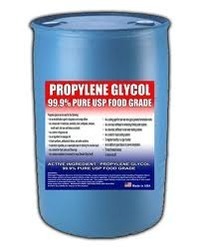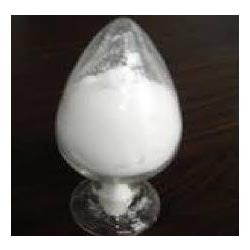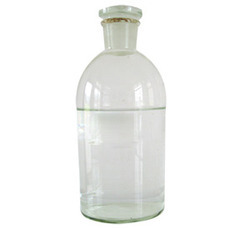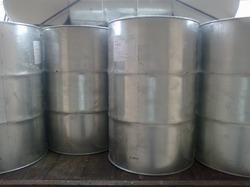Propylene Glycol
Propylene Glycol Specification
- Type
- Industrial Grade
- HS Code
- 29053200
- Application
- Used in food, pharmaceutical, cosmetic, and industrial applications
- Boiling point
- 187 C
- Color
- Colorless
- CAS No
- 57-55-6
- Smell
- Odorless
- Usage
- Solvent, Humectant, Antifreeze agent
- Feature
- Odorless, hygroscopic, miscible with water
- EINECS No
- 200-338-0
- Molecular Formula
- C3H8O2
- Grade
- USP / Industrial Grade
- Appearance
- Colorless, clear, viscous liquid
- Ph Level
- 6.0 8.0 (5% solution)
- Purity
- 99.5% Min
- Chemical Name
- Propylene Glycol
- Water Content
- Max 0.2%
- Melting Point
- -59 C
- Molecular Weight
- 76.09 g/mol
- Structural Formula
- CH3-CHOH-CH2OH
- Poisonous
- Non-poisonous
- Other Names
- 1,2-Propanediol
- Physical Form
- Liquid
- Solubility
- Miscible with Water, Acetone and Chloroform
- Shelf Life
- 2 Years
- Density
- 1.036 g/cm at 20C
- Packaging
- 200 kg Drums, 215 kg Drums, ISO Tanks, Bulk
- Viscosity
- 58.1 mPa.s at 25C
- Storage Conditions
- Store in sealed container in cool, dry ventilated place
- Stability
- Stable under recommended handling and storage conditions
- Flash Point
- 99 C (Closed Cup)
- Refractive Index
- 1.431 1.433 at 20C
Propylene Glycol Trade Information
- Minimum Order Quantity
- 1 Dram
- Payment Terms
- Paypal, Letter of Credit (L/C), Western Union, Cash in Advance (CID), Cash Advance (CA)
- Supply Ability
- 10 Drams Per Week
- Delivery Time
- 7 Days
- Sample Available
- Yes
- Sample Policy
- Sample costs shipping and taxes has to be paid by the buyer
- Main Export Market(s)
- Western Europe, Australia, Eastern Europe, Central America, Middle East, South America, Asia, North America, Africa
- Main Domestic Market
- All India
About Propylene Glycol
Propylene Glycol
Being a quality centric company, we are presenting an outstanding range of Propylene Glycol. The offered Propylene Glycol is processed according to the market norms by utilizing best grade chemical compounds in accurate composition. Apart from this, we offer this Propylene Glycol in number of packaging options with different stipulations at affordable rates.
Features:
- Pure in nature
- Safe usage
- Colorfastness
| Physical State | Liquid |
| CAS No | 57-55-6 |
| Purity % | 99% |
| Packaging Details | 200 kg Drum |
| Grade Standard | Industrial Grade |
| Color | Colourless |
| Density | 1.036 |
| Formula | C3H8O2 |
| Usage/Application | Solvent for food colors and flavors,Humectant in medicines or food products,Artificial smoke |
| Synonyms | 1 2-Dihydroxypropane,C3H8O2,Methylethylene glycol,Methyl ethyl glycol |
Versatile Industrial Applications
Propylene Glycol finds broad usage in the food, pharmaceutical, cosmetic, and industrial sectors. Its utility as a solvent, humectant, and antifreeze agent makes it a valuable ingredient for formulations requiring moisture retention, enhanced dissolution, or freeze protection. This versatility has established Propylene Glycol as a staple chemical for manufacturers and exporters.
Quality and Safety Standards
Manufactured to USP and Industrial Grade specifications, Propylene Glycol is colorless, odorless, and non-toxic under proper handling. With a shelf life of two years when stored in sealed containers in cool, dry, and ventilated areas, it ensures product integrity and compliance with international quality standards. The stable nature of this chemical further bolsters its safety profile during shipping and storage.
Packaging and Logistics Options
Propylene Glycol is available in various packaging solutions including 200 kg drums, 215 kg drums, ISO tanks, and bulk deliveries. These formats accommodate both small-scale and large-scale requirements, ensuring efficient supply for importers, exporters, and suppliers globally. The product is shipped with clear labeling and documentation, facilitating hassle-free logistics and regulatory adherence.
FAQs of Propylene Glycol:
Q: How should Propylene Glycol be stored to maintain its quality?
A: To preserve its stability and extend shelf life, Propylene Glycol should be stored in tightly sealed containers under cool, dry, and well-ventilated conditions. Avoid direct sunlight and sources of ignition, keeping the product away from moisture to prevent contamination.Q: What are the common applications of Propylene Glycol in various industries?
A: Propylene Glycol serves as a solvent, humectant, and antifreeze agent. It is widely used in the manufacturing of food products, pharmaceuticals, cosmetics, and in industrial processes for moisture control, product formulation, and freeze protection.Q: Where is Propylene Glycol produced and supplied from?
A: This industrial-grade Propylene Glycol is exported, imported, and supplied from India, with distributors offering global shipping and a variety of packaging options to meet international demand.Q: When does Propylene Glycol reach its end of shelf life and how can you ensure optimal usage?
A: Propylene Glycol has a shelf life of two years when stored properly in sealed containers under recommended conditions. Always check production and expiry dates on packaging and use the oldest stock first for maximum efficiency.Q: What is the process of handling Propylene Glycol in an industrial setting?
A: Employees should use protective gear when handling Propylene Glycol, ensure containers are properly sealed, and store the product away from heat sources. Follow all safety data sheet (SDS) recommendations for leak, spill, and disposal procedures to maintain a safe working environment.Q: What are the benefits of using Propylene Glycol over other glycols?
A: Propylene Glycol is preferred for being non-toxic, odorless, and highly miscible with water, acetone, and chloroform. Its low toxicity makes it suitable for sensitive applications like food and pharmaceuticals, while its physical properties ensure versatility in industrial uses.

Price:
- 50
- 100
- 200
- 250
- 500
- 1000+
More Products in Construction Chemicals Category
Polyethylene Glycol
Price 95 INR
Minimum Order Quantity : 25 Grams
CAS No : 25322683
Water Content : 0.5%
Color : Other, Colorless or white
Chemical Name : Polyethylene Glycol
Diethylamine Chemical
Price 150 INR
Minimum Order Quantity : 25 Kilograms
CAS No : 109897
Water Content : Max 0.3%
Color : Other, Colourless to pale yellow
Chemical Name : Diethylamine
Phenol Crystal
Price 27500 INR
Minimum Order Quantity : 1 Dram
CAS No : 108952
Water Content : 0.5% (approximate)
Color : Other, Colorless to light pink
Chemical Name : Phenol
Allyl Alcohol
Price 180 INR
Minimum Order Quantity : 25 Kilograms
CAS No : 107186
Water Content : 0.1% (typical)
Color : Colorless
Chemical Name : Allyl Alcohol
 English
English Spanish
Spanish French
French German
German Italian
Italian Chinese (Simplified)
Chinese (Simplified) Japanese
Japanese Korean
Korean Arabic
Arabic Portuguese
Portuguese Send Inquiry
Send Inquiry




 Send Inquiry
Send Inquiry Send SMS
Send SMS
